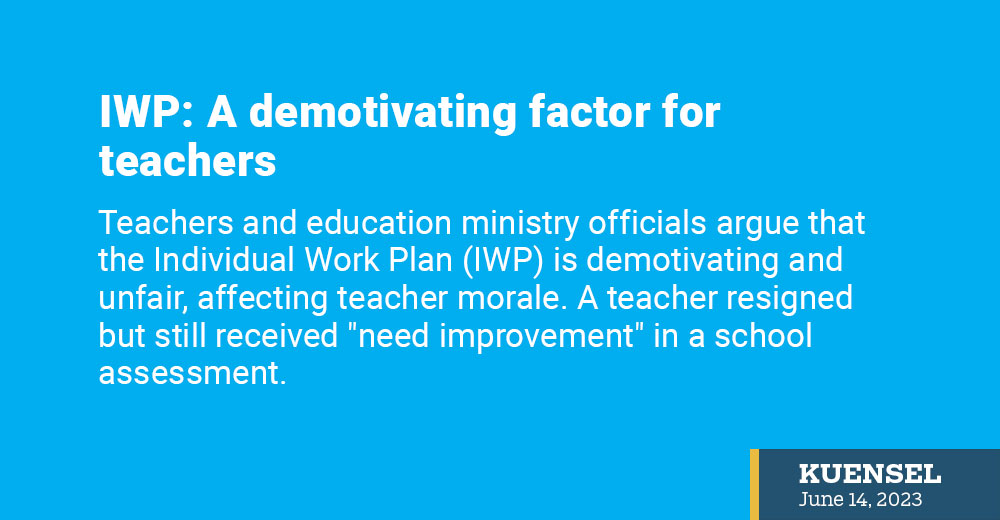Rinzin Wangchuk
Both teachers and the education ministry officials find themselves at odds with the Individual Work Plan (IWP), which they claim has been a demotivating factor for educators.
This assessment tool, according to the ministry, has been criticised for its adverse impacts on teacher morale and its perceived lack of fairness.
One recent incident involved a teacher who had resigned and left Bhutan more than six months ago yet was still placed in the “need improvement” category during the IWP assessment at a school.
To further exacerbate the situation, some schools have resorted to using contract teachers to rate their colleagues in the “need improvement”. “This practice has raised concerns about the accountability and transparency of the moderation committee responsible for assessing teachers’ performances,” according to a former contract teacher.
The IWP was introduced by the Royal Civil Service Commission (RCSC) as part of its “Managing for Excellence” initiative in 2017. The aim was to align strategic objectives and improve individual accountability within government agencies, including the education sector.
The RCSC categorized staff as outstanding, very good, good, or in need of improvement based on a bell or distribution curve. Recently, the need improvement category has been renamed “partially meeting expectations” (PME). The moderation committee then ranks civil servants according to the agency categorization framework, which is linked to Annual Performance Agreements (APA).
The challenges
The main challenge faced by the moderation committee and managers is the difficulty of determining who should be placed in the outstanding category when there are multiple teachers who exceed the given requirements. A survey conducted by Jamyang Chophel, a former PGDPA student of the Royal Institute of Management, revealed that teachers struggle with segregating colleagues into the need improvement category.
They argue that it is irrelevant to differentiate between teachers when everyone is performing the same tasks. The perceived unfairness of the categorisation process, despite equal workload and responsibilities, has contributed to a higher attrition rate among teachers.
A former teacher and principal, who resigned to pursue higher education in Australia, expressed dissatisfaction with the IWP. He argued that the performance of teachers is already assessed based on yearly plans, block plans, monthly plans, weekly plans, and daily lesson plans. According to him, all teachers who worked with him deserved ratings of “outstanding” or “very good” because they had equally contributed to achieving their targets. “Placing someone in the need improvement category seemed unjustified in such circumstances,” he said.
Education and Development Skills Minister JB Rai told Kuensel that the ministry had implemented the Bhutan Professional Standard for Teachers (BPST) in 2019, which was endorsed by Parliament. He believes that the BPST system provides sufficient evaluation for teachers and considers the IWP to be an additional burden.
“Despite repeated requests from the education ministry, the RCSC has refused to do away with the IWP system,” Lyonpo JB Rai said.
The ministry has, however, been reminded to submit a standard template for teachers’ performance dashboards to facilitate progress updates according to RCSC officials.
Many urban and rural teachers claim that the implementation of the IWP has increased their workload, diverting their attention from teaching to documentation and competency behavior activities. “This shift has compromised the quality of education,” a school teacher in Thimphu said.
A principal from Bumthang highlighted the demoralizing effect of placing colleagues in the need improvement category, especially when everyone dedicates their time to teaching and guiding students. “As per the RCSC’s IWP framework, each school should place at least two teachers under NI category, which is unfair,” he said.
What RCSC has to say?
The RCSC officials said that the current trend indicates that those who resigned were primarily in the outstanding and very good categories, with very few in need of improvement. However, according to their records, only seven teachers placed in the need improvement category have resigned.
As of today, 547 from the Education and Training Services Group have resigned since January 2023. “As the attrition rate among teachers continues to rise, it is imperative to reassess the effectiveness and impact of the IWP system on teacher motivation and overall educational outcome,” an official from the ministry said. “Both teachers and ministry are the victims of IWP.”
According to RCSC’s media focal person, all teachers are placed in the outstanding category when there was no moderation. “That is why moderation exercise was made mandatory,” she said.
For instance, as per the data analysis of performance rating (IWP before moderation), 132 schools rated 24,988 teachers as outstanding (81.4%), 4,507 as very good, 1,020 as good, and only 11 teachers placed in the need improvement category in 2020 to 2022. They have not rated the performance of 167 teachers.
While documentary evidence is not mandatory, individual supervisors are expected to keep track of their direct reportees. The RCSC’s online system, MAX, provides a platform for real-time updates on achievements. The commission believes that the success of MAX depends on the ability of leaders and officers in the civil service to objectively evaluate and accurately assess performance.
The impact of moderation is yet to be fully understood, as anecdotal accounts suggest that staff are more concerned about being held accountable during the exercise than genuinely improving their performance.
RCSC officials said that supervisors are responsible for managing performance and addressing poor performance through reviews and rewards for those who excel. “Performance ratings are also considered in HR actions, such as open competitions for scholarships and higher-level positions,” she said.


